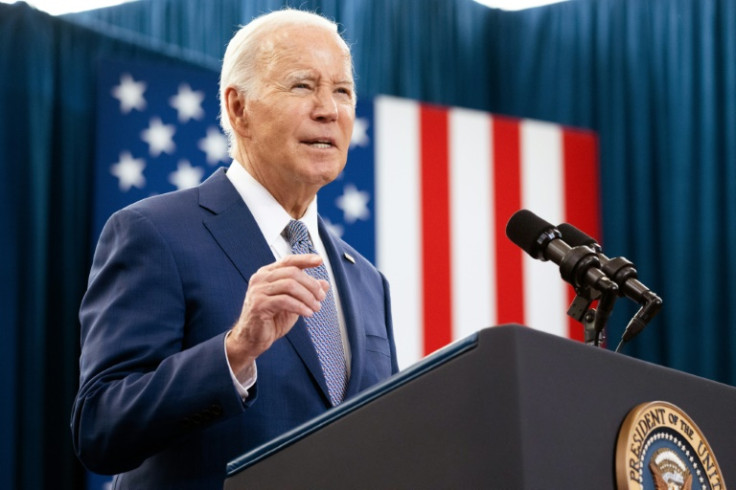
US President Joe Biden's agenda for a second term has so far hinged on the fact that he isn't Donald Trump -- but will it be enough to keep him in the White House?
Trump's landslide victory in the Republican Iowa caucuses has set the stage for a bitter rematch with Biden that the 81-year-old Democrat seems to relish.
Despite low approval ratings and polls showing him even with or trailing Trump, Biden is treating his twice-impeached, criminally indicted predecessor as his preferred opponent.
And while some Democrats voice concerns that Biden's campaign has no strong message about what he'd do with four more years, the president often seems content with telling voters what he is not.
In speech after speech he's painted a dark picture of dictator-like, retribution-obsessed Trump -- and himself as the only man who can beat him and save America's institutions.
"This election ultimately will be Donald Trump versus Joe Biden. And so there's a clarity that comes with that," Abou Amara, a lawyer and Democratic strategist, told AFP.
"It helps to raise the stakes of this election. It's not just going to be a debate over policy -- it's going to be a fight over democracy itself."
Biden's allies are also using the fear factor of a Trump comeback to rally voters. Vice President Kamala Harris said she's "scared as heck" while former first lady Michelle Obama admitted to being "terrified."
Trump, who has falsely claimed that Biden's 2020 election win was "stolen", has hit back by saying it is Biden who is the threat to democracy.
Critics, especially among younger and more progressive Democrats, say Biden hasn't given voters a compelling narrative about how he'd improve their lives in a second term.
The campaign has largely dropped mentions of his much-trumpeted "Bidenomics" policy while many voters are still struggling to make ends meet because of high prices caused by inflation.
Instead the Biden campaign's strategy has been to hammer Trump -- and it may be working.
Recent polls have shown Biden trailing in key battleground states, but a Quinnipiac University survey on January 10 showed Biden narrowly beating Trump in pivotal Pennsylvania by 49 percent to 46 percent.
In October Trump was ahead by 47 percent to 45.
More importantly the poll showed voters thought "preserving democracy" was the most important issue facing the nation, on 24 percent -- ahead of border security on 23 percent and the economy on 15 percent.
After Iowa, Biden pounced on Trump's steamroller victory over rivals Ron DeSantis and Nikki Haley to sell himself as "still the only person to ever beat Donald Trump."
The president is also using Trump as a fundraising vehicle, pointing out that his campaign had raised $1.6 million from grassroots donors in the 24 hours after Trump won Iowa.
"It's not going to be about Mr Biden's manifesto, I can pretty much promise," William Galston, senior fellow at the Brookings Institution, told AFP.
"It's going to be a choice between two people whose records and governing styles American voters don't have to speculate about."
There are warnings, though, that the laser-focus on Trump and the branding by Democrats of his supporters as "MAGA extremists" -- a reference to Trump's Make America Great Again slogan -- could backfire.
"I think this negative talk about MAGA is going to hurt Biden's election campaign," Jamie Dimon, chief executive of US bank JPMorgan Chase, told the MSNBC network, adding that many Trump voters had legitimate concerns about issues including immigration.
Biden's attacks on Trump have obscured some of the key policy issues that the campaign has talked up in recent weeks.
"It's true that there has to be more than just that message", said Amara, the strategist.
Democrats are for example making reproductive rights a key issue in the 2024 race, focusing on Trump's celebrating that his Supreme Court picks helped overturn the Roe v. Wade decision that granted the right to abortion.
The Biden campaign would also use "micro-targeted messaging" to groups including young people, Black people, women and seniors.
A clearer Biden program would "come with time," added Amara.








